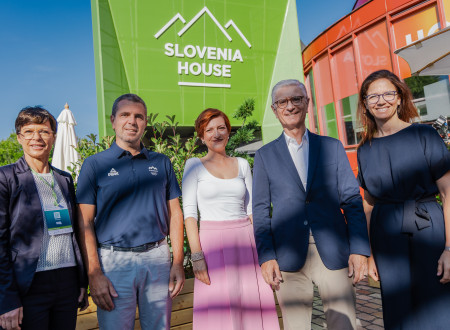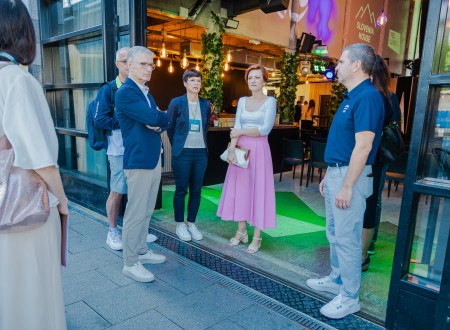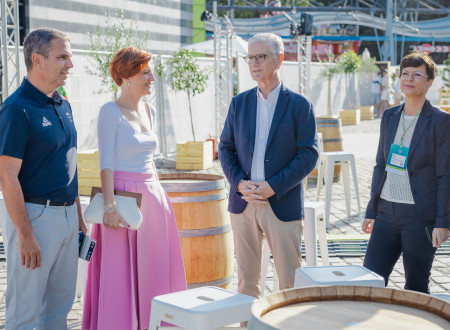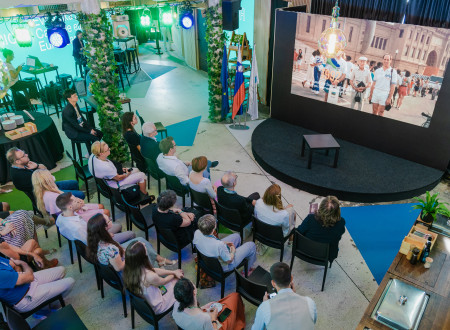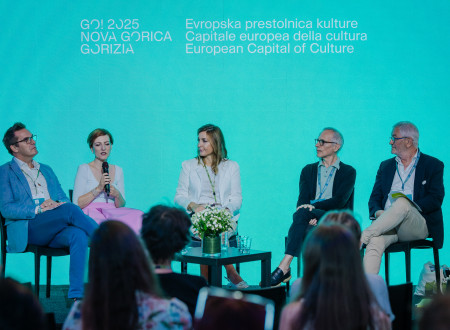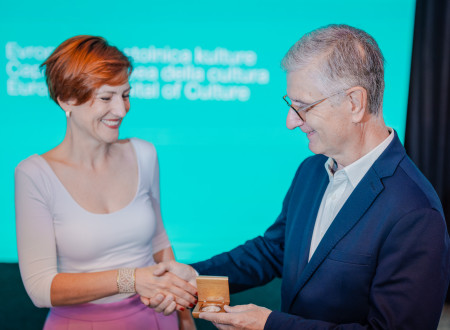Minister of Culture Asta Vrečko at the Day of Slovenian Culture in Paris
The Slovenia House in Paris is therefore an excellent opportunity not only from the point of view of promoting Slovenian sport: it also opens up excellent opportunities for the widest possible presentation of Slovenia, its culture, science, cuisine and tourism. While 206 Olympic Committees with their national teams are present at this year's Olympic Games, the Slovenia House in Paris is one of only 40 national houses dedicated to the presentation of countries. The Slovenia House is highlighted as one of the five that have attracted the most interest and left the best impression among visitors.
"Sport and culture are great partners, great allies – not only when it comes to Slovenians living abroad, who are always closely linked by sport and culture. At home, in our local environments, we all love both sport and culture as well. I am glad that in this house we can celebrate sporting successes on the one hand, but at the same time, in various gatherings at roundtables, we can discuss topics such as gender equality, the green transition, sustainability, the future of athletes after their sporting careers and also culture," emphasised Franjo Bobinac, President of the Slovenian Olympic Committee.
Today's event at the Slovenia House is dedicated to the Day of Slovenian Culture, which includes a presentation of Nova Gorica, next year's European Capital of Culture.
"My sincere thanks go to the Olympic Committee and its President, Mr Bobinac, for including culture and art in the programme of the Slovenia House as soon as preparations for the Olympic Games began. Slovenia is thus presented through its many faces, and culture and sport are very closely linked, with many parallels between them. The Olympics are always accompanied by a wide range of cultural events, and there used to be the Cultural and Artistic Olympic Games as well. One hundred years ago, in 1924 in Paris, the Slovenian sculptor Ivan Zajec presented his work. The Olympic values of peace, solidarity, integration and coexistence are also the message of the European Capital of Culture, which will take place next year in Nova Gorica under the motto ‘Borderless’," stressed Minister of Culture Asta Vrečko. The Minister visited the Slovenia House and took part in the presentation of Slovenian cultural production and the achievements of Slovenian artists.
The Day of Slovenian Culture began with a screening of a film about the legendary Slovenian athlete Leon Štukelj, organised by the Dolenjska Museum Novo Mesto. The film was presented by Jasna Dokl Osolnik, Director of the Museum. Exactly 100 years ago, Štukelj won his and Slovenia’s first Olympic gold medal in the French capital.
"Sport and sports history are important parts of our history. The history of sport is also linked to the history of national emancipation, and through this we can see how we have developed as a society and as a country. It also promoted the development of media and sports journalism. This also played an important role in the period of Leon Štukelj's performances, or in the way the media and the public perceived and followed the successes of Leon Štukelj. The presentation of the new film on Štukelj by the Dolenjska Museum has a special value for the global public, as his heartening life story continues to be a great inspiration, especially his messages about the Olympic spirit, the importance of sport and peace, which are also highlighted in the film," added Minister Vrečko.
This was followed by a roundtable on the integration of culture, tourism and sport, which was attended by the Minister of Culture, Asta Vrečko, the Mayor of the Municipality of Nova Gorica, Samo Turel, the Vice-Mayor of the Municipality of Saint-Denis, Yannick Caillet, and the Team Leader for Cultural and Creative Industries at the European Commission, Sylvain Pasqua. The discussion was moderated by Mija Lorbek, Director of the GO! 2025 Public Institute.
In the evening, MN Dance Company, project partners from the official GO! 2025 programme, performed at the Slovenia House, combining contemporary and street dance styles in a performance with dancer Tomi Fly. The evening ended to the rhythms of the Slovenian band Manouche.


